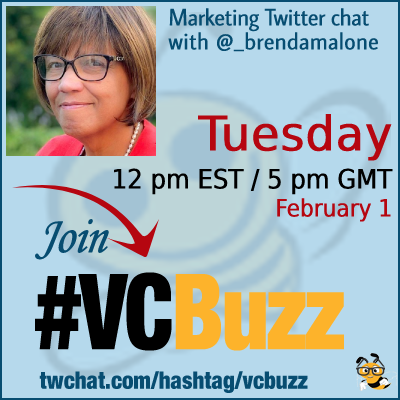
WordPress is one of the most flexible and user-friendly content management platforms out there.
It has been evolving for many years, supported by an ever-growing community of developers.
But as WordPress has been evolving its technical SEO suite over the years, so have Google’s requirements.
With site speed, page experience and core web vitals, Google has been slowly but surely introducing advanced tech requirements WordPress users – many of which are amateur web developers like myself – have had to face.
What is WordPress technical SEO today and how can we tackle it? Let’s discuss!
***Add #VCBuzz chats to your calendar here.
***Please sign in here to follow the chat -> twchat.com/hashtag/vcbuzz
About Brenda Malone @_brendamalone
Brenda Malone @_brendamalone is an experienced Technical SEO, WebDev, IT and Communications Professional with a demonstrated history of working in the government and private industries.
Connect to Brenda on Linkedin
Questions we discussed
Q1 How did you become a digital marketer? Please share your career story!
Started in MarCom in late 1970s, before the internet was a thing—owned a printing company and did own marketing. Got first Mac in 1984, loving the intersection of Marketing and IT. Sold the printing company and went to work for a government agency.
I grew, learned via a subscription for over 15 years. Self-taught IT and went deep into marketing/communication. Built agency’s 1st website and intranet, learned all types of web technologies. Stayed over 20 years, retired in 2017.
In 2015, started learning SEO, in 2017, joined Advance Local as a Technical SEO specialist, where I learned and grew in my SEO career. Fast forward to today, I am the SEO Technical Strategist for Advance where I touch hundreds of websites of all kinds.
I think most people simply fell into Digital Marketing – it is so young, most higher learning is behind, so mentoring and self-learning are key.
In the Agency, I was the Unicorn. I had no one to learn from. I was the intersection of Designer, Coder, Database Analyst, Marketer, Grantwriter and Community Liaison. Having no peers led me to embrace self-learning.#VCBuzz
— Brenda Malone, Triple-Vaxxed and Still Masking (@_brendamalone) February 1, 2022
Q2 What are core web vitals and why should we care?
CWV are ranking factors Google considers important factors for a good User Experience. Contains 3 specific web page measurements from Page Speed and User Interaction Measurements. Basically, Google’s way of rating a web page’s over User Experience (UX).
@vcbuzz A2 Publishing information to a WordPress blog or other website/CMS will not be effective if you're not leading people to the content and ultimately to respond to your Call To Action. Paying attention to the fundamentals helps ensure you're succeeding. #vcbuzz
— Courtney Rogers (@CourtneyMRogers) February 1, 2022
3 CWV metrics are: Largest Contentful Pain (LCP) – is your site fast, when could user FEEL they could interact; First Input Delay (FID) – how long before the user COULD interact with page; Cumulative Layout Shift (CLS) – was the layout stable or did it jump about.
A2. 2/2 With SEOs and digital marketers wondering why they dropped in organic search, it's worth checking to see if the competition aligned better with Core Web Vitals metrics. #vcbuzz
— Jeannie Hill (@essentialskill) February 1, 2022
Care because want User to have good UX with the site and return/share it; It is also a new Google Ranking Factor as part of the new Page Experience Signals, along with mobile-friendly, and security. We have no idea what the weight of this factor is, however.
A2
— Debi Norton (@BRAVOMedia1) February 1, 2022
Core web vitals in a nutshell is all about how quickly the browser can load the site – measured by 3 matrix.#VCBuzz
Q3 How can one ensure their core web vitals are high on WordPress-run sites?
Setup page caching-speeds server response—use a plugin or use server caching. Learn how to properly use any caching plugin-search Google for best settings, and use trial and error. Do make sure to learn about “serving static assets w/efficient cache policy”
@vcbuzz A3 Probably the easiest way is to run top WordPress plugins for SEO, but I would love to learn more about the fundamentals of this to ensure that the plugin I use is keeping up with changes to Google's algorithm and I'm managing it in the best way! #vcbuzz
— Courtney Rogers (@CourtneyMRogers) February 1, 2022
Optimize Images. Properly-sized images is probably The One Most important thing the site owner can do. Either use a tool to optimize before uploading, or use a plugin to optimize when uploading to WordPress. Many high-quality plugins exist solely for this.
A3
— Debi Norton (@BRAVOMedia1) February 1, 2022
Utilize a very minimal theme and skip the plugins and hard code the essentials.#VCBuzz
Choose wisely. Choose well-coded, pro-recommended themes and plugins. Bad coding will kill your CWV, no matter what, a slow, faulty theme will thwart all of your efforts. Look beyond the presentation and learn about the function of anything you use on your site.
A3. Ways to Improve Core Web Vitals on WordPress
— Jeannie Hill (@essentialskill) February 1, 2022
?Establish page caching
?Optimize browser caching
?Compress images
?Streamline code
?Use server-level compression
?Use preconnect for key resources
?Use CDNhttps://t.co/1OBw5H1xtd #vcbuzz https://t.co/6Fv7mFCKNL
Use a Content Delivery Network (CDN) if your site and audience are wide enough to warrant. It reduces loading speed. But, be careful, a lot of sites will not need a CDN, just good optimization.
A3: Yes, I'm Team Optimize Images too, learn how to use GIMP on the free side. Also, two WP plugins made a big difference: Autooptimize (crushes CSS and JavaScript bloat) and WP Fastest Cache.#vcbuzz
— Don Dingee (@don_dingee) February 1, 2022
Seriously consider the need for interstitials – popups, ad blocks that are “above the fold”, chat boxes, SLIDERS (just say no to sliders!)
A3 I have only casually had experience because of client use, but I have noticed that they error-out. A Lot. It is also difficult to get good metrics as easily as you can with lighter themes.#VCBuzz
— Brenda Malone, Triple-Vaxxed and Still Masking (@_brendamalone) February 1, 2022
Q4 How to check your WordPress site technical health? What should you consider your site optimized enough?
I use webpagetest.org exclusively for testing performance. Granted, it is a bit techy, but it is THE ultimate for checking and improving CWV.
A4
— Debi Norton (@BRAVOMedia1) February 1, 2022
Download the theme and start a tech SEO audit on it.#VCBuzz
For non-technical folks, try any other Waterfall app, GTMetrix, Pingdom, etc. BUT, be aware that the free versions will only give limited, desktop-oriented 411 that is not related to mobile scoring that Google uses.
A4. WordPress technical health is a skilled niche in its own right. I'd recommend if someone is not already familiar with it, hire a person who is. #vcbuzz
— Jeannie Hill (@essentialskill) February 1, 2022
The One Best Place to check your CWV is Google Search Console. Mandatory to setup GSC and learn to understand the 411 that Google is discovering about your site. Nothing better.
A4: I update older content regularly, including fixing broken links, etc. to create a better user experience. Recently, I started using https://t.co/EgLB8EznAv, which is easy to use and has an Auto feature too. #vcbuzz #SEO https://t.co/cfpQKSTaZd
— Jaime Shine ?️ (@jaimeshine) February 1, 2022
Also, there are many apps and browser extensions to help keep an eye on your WordPress site health. There are even plugins that include everything-at-a-glance inside your install.
A4bhttps://t.co/N6jv2wHn1h vs. https://t.co/hThEg4H08r
— Debi Norton (@BRAVOMedia1) February 1, 2022
I'd choose the .org themes anytime over the .com ones.#VCBuzz
Q5 What are your favorite technical SEO WordPress plugins and standalone tools?
I love Yoast, SEOPress Pro, and SchemaAppStructuredData plugins for WordPress sites. They allow me to control every thing like Page Titles, Meta Descriptions, Robots and XML files and they are well-maintained.
Many use Google Site Kit—but I install all Google Services Tags myself, but non-techs may find it valuable. Lots of non-techs also install Analytics plugins for simplicity, but I prefer to go to the source, like GA or Search Console or other SEO Tools for stats.
Some of my SEO arsenal includes: Search Console, @googleanalytics, @screamingfrog, @semrush, Keywords Everywhere, @RealWebPageTest, PageSpeed Insights, MobileFriendlyTestingTool, StructuredDataTestingTool, and @sheetsmarketers
Chrome Extensions I MUST have: LinkRedirectTrace, SEO Pro Extension, @DNSlytics, GoogleTagAssistant, LinkGrabber, @Ryte_EN, CoreWebVitals, CloudinaryMedia, QuickJavascriptSwitcher, Wappalyzer, WASP.inspector, IP Address and Domain Info.
A5: Good tip on https://t.co/BqOC9zc3Y5. I have two extensions in Chrome to look at tech and on-page SEO for sites very quickly: Blue Button, and SEO Pro Extension. I'm also a big fan of Google Tag Manager, cuts down on install questions. #vcbuzz
— Don Dingee (@don_dingee) February 1, 2022
But the most important tool is an inquisitive mind and the ability to search and find the joy in finding patterns and make them work for you!
Our previous technical SEO chats:
- Core Web Vitals and Why Care with @Brad_Bauer
- Website Migration with @JacobStoops
- SEO after a Redesign with @JeffLouella
- Develop an Effective & Realistic Scope of Work for a Website Redesign with @JonMikelBailey
- Starting and Managing a Successful Niche News Website w/ Barry Schwartz @rustybrick
- How to Set up Fully Functioning, Living and Breathing Affiliate eCommerce Website with Patrick Coombe @pmkoom
- How to Improve Your Site Structure? with Bobby Kircher @bobbykircher
- SEO Migrations: Tips and Steps with @Renee_Girard
- SEO Entities and Google’s NLP with @KrystianSzastok



